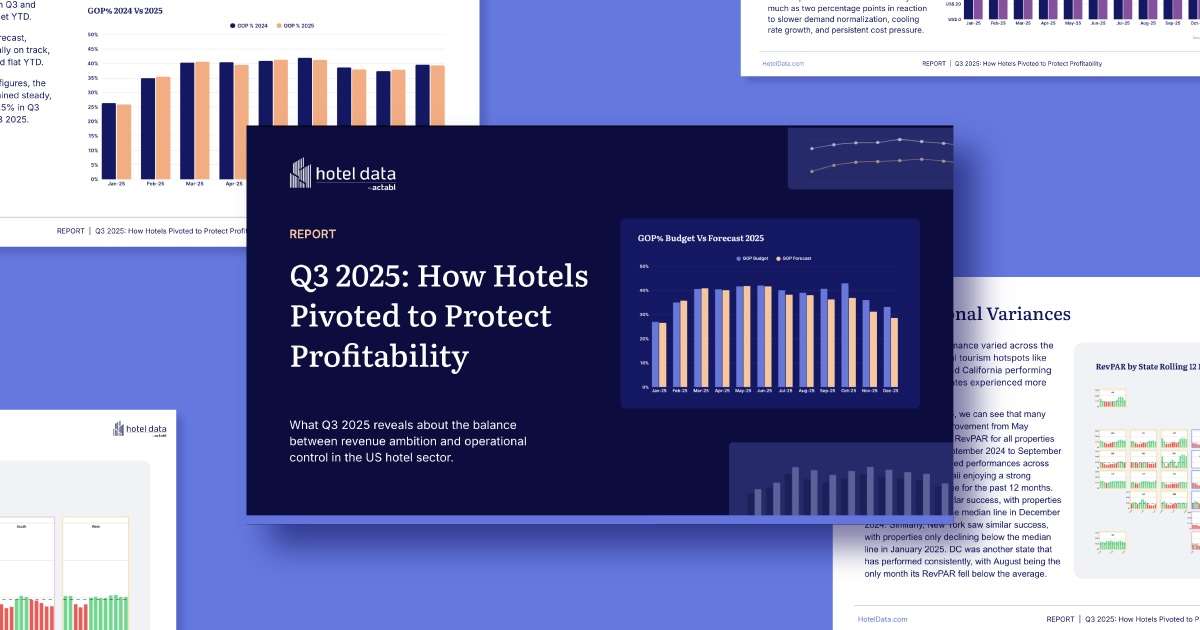
Have you ever found yourself buried in spreadsheets, trying to manually forecast your hotel’s revenue? I’ve been there, and I know how frustrating and limiting those traditional methods can be. But imagine this: spending less time crunching numbers and more time crafting strategic decisions that truly move the needle for your hotel. In this article, we’ll go over how modern technology and integrated strategies can transform your revenue management, making your hotel competitive, agile, and ready for the future.
Download the Modern Revenue Management Guide.
A Quick Look Back: Understanding the Roots to Anticipate the Future
Revenue management began in the airline industry of the late 1970s with a concept called “yield management.” Airlines needed ways to dynamically adjust seat prices based on demand. This strategy migrated into hospitality during the 1980s when hoteliers recognized the similarity in perishable inventory—rooms, like airplane seats, have a limited shelf-life.
Initially, hotel revenue management relied on historical data, paper reports, and intuition. As digital technologies emerged, hoteliers transitioned to Excel spreadsheets, periodic analyses, and eventually, embraced online travel agencies (OTAs). This new digital complexity made revenue managers act more like commercial analysts, juggling distribution strategies and cost management. Now, as AI and automation take center stage, the landscape is changing once again.
The Game Changer: Big Data, AI, and Machine Learning
Today, the hospitality industry is propelled by big data and AI technologies that have radically transformed revenue management. Rather than simply compiling historical booking data, modern AI-native systems interpret trends and can predict market movements. For instance, predictive models can analyze flight search trends and identify booking opportunities long before they occur, shifting your strategy from reactive to proactive.
Cloud computing has made these sophisticated analyses accessible and affordable, allowing even smaller hotels to harness real-time data and actionable insights. Imagine replacing hours spent by multiple team members on manual reports with a single strategic thinker, enabled by AI. This allows your hotel to predict customer behavior, refine pricing dynamically, and personalize offers—all crucial for gaining competitive advantage. Additionally, by freeing up your team’s time, you allow them to focus on higher-value activities, such as refining the strategy, and improving guest experiences.
Shifting Roles: From Data Management to Strategic Leadership
With technology handling the tactical tasks, the role of the revenue manager is evolving significantly. If you are yourself a revenue manager, your role now transcends mere rate adjustments; you’re orchestrating broader commercial strategies.
Consider this example: instead of spending time on repetitive forecasting, you now focus on identifying trends in feeder markets or planning targeted marketing campaigns for upcoming need periods. The result? You’re positioned not just as a manager, but as a strategic leader driving your hotel’s profitability and market position.
For More Information, Download the Modern Revenue Management Guide.
Aligning Revenue, Marketing, and Sales: The Integrated Commercial Strategy
It has become quite obvious now that breaking down silos between revenue management, marketing and sales is no longer optional. Teams must regularly meet, share data, and align their strategies around unified KPIs, such as acquisition costs and booking pace.
For instance, hotels seeing low occupancy periods could jointly strategize with marketing to launch targeted campaigns well in advance, using pace data and market intelligence. Aligning your teams around clear objectives and collaborative processes will amplify results significantly.
Common Pitfalls: What Automation Can’t Fix
Despite the advantages of automation, it’s important to recognize its limitations. AI is powerful, but it can’t replace your vision or leadership. It supports decision-making but won’t solve issues like poor brand positioning, bad reviews, or weak customer service.
To avoid falling into traps, keep these good practices in mind:
- Never treat automation as a substitute for strategic thinking.
- Always ensure pricing aligns with your brand’s perceived value and positioning.
- Don’t overload your teams with unnecessary data; focus on insights that truly matter.
Practical Roadmap: Steps to Future-Proof Your Revenue Management
Taking the above into account, here’s what your action plan might look like:
- Reframe your mindset: Treat revenue management as a central strategic function.
- Break down organizational silos: Conduct regular joint meetings between revenue, marketing, and sales.
- Deploy suitable technology: Choose sophisticated, automated systems to handle tactical tasks.
- Collaborate strategically: Demand insightful recommendations from consultants, not manual reporting.
- Establish a strategic operating rhythm: Conduct weekly pace reviews, monthly performance benchmarks, and quarterly repositioning assessments.
For More Information, Download the Modern Revenue Management Guide.
Mastering the 4Ps of Revenue Management for Sustainable Success
Remember the 4Ps of revenue management—Pricing, Positioning, Pace, and Performance? Well, understanding them is crucial:
- Pricing: Adjust rates according to perceived value and market conditions.
- Positioning: Align your marketing efforts, reviews, and visual content with pricing strategies.
- Pace: Constantly monitor booking trends to identify market shifts.
- Performance: Regularly use benchmarks to assess and improve your revenue strategies.
Developing Commercial Awareness Across the Hotel
Building commercial awareness isn’t exclusive to your revenue management team. Your front desk, operations, and service teams should also understand key market trends and competitive positioning. Consider regular training sessions or brief updates to foster a commercially aware culture throughout your hotel.
Conclusion: Leveraging Technology, Not Replacing Talent
Ultimately, successful revenue management isn’t about accumulating more data, it’s about using data in a smarter way and more effectively. Today, it is crucial to blend technological capabilities with human insights to gain a true strategic advantage. Now is the time to shift your strategy towards integration, agility, and adequate thinking. In closing: Don’t wait and see; start embracing innovation and amplifying your hotel’s true potential.
For Additional Insights, Download the Full Guide.
Stay Informed with LodgIQ
Subscribe to our newsletter for the latest insights and strategies from our team of revenue management experts. Visit https://lodgiq.com/ and stay ahead in the hospitality industry.
LodgIQ™ is a leading AI-enabled revenue management platform for the hospitality industry, transforming data integration and decision-making for hotel commercial teams. Our platform consolidates Revenue, Sales, and Marketing data, providing insights into market trends and consumer behaviors for strategic, data-driven decisions. LodgIQ offers a real-time, comprehensive view of key metrics, enhancing room rate adjustments, marketing campaigns, and sales strategies. Committed to optimizing operations and maximizing revenue, LodgIQ is the essential tool for unified commercial strategies in hospitality. Currently working with over 550 hotels, LodgIQ’s products combine sophisticated machine learning with an intuitive and powerful user interface, delivering advanced recommendations and actionable analytics. LodgIQ is headquartered in Silicon Valley, with offices in New York City, and Bangalore. For more information visit https://lodgiq.com/
Alex Woolsey
Vice President of Business Development
LodgIQ™


